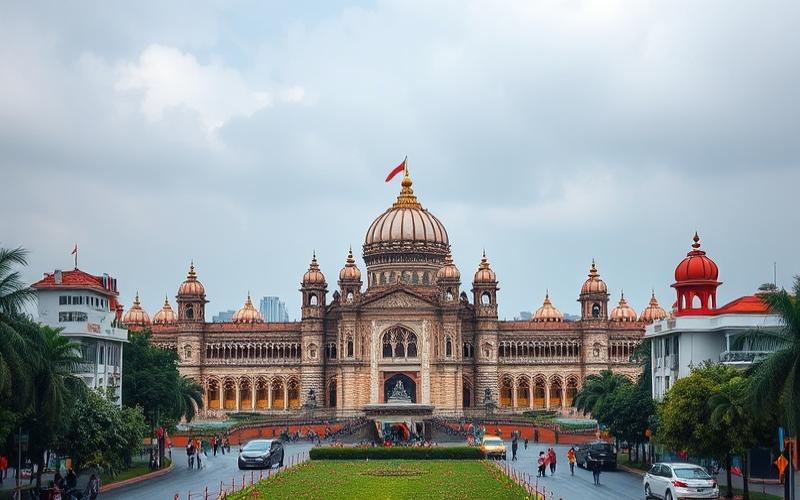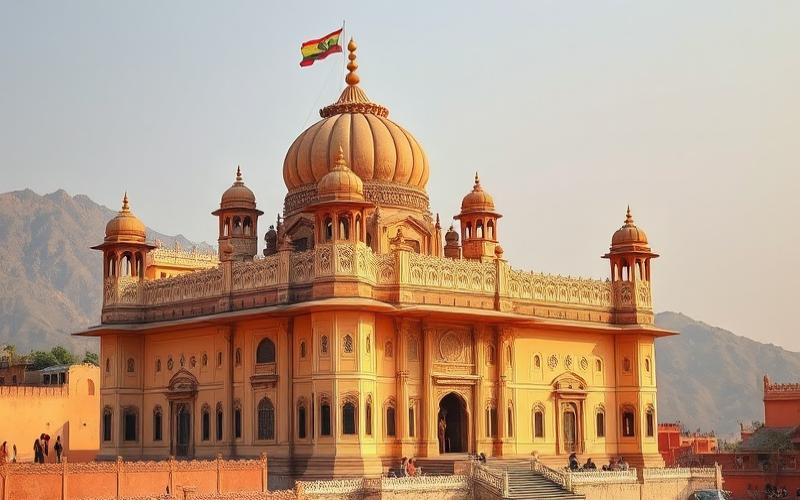
 Published on and written by Cyril Jarnias
Published on and written by Cyril Jarnias
India: A Prime Destination for Digital Nomads
A vast and fascinating country of countless contrasts, India is becoming a destination of choice for digital nomads seeking to combine work and discovery.
From Bangalore, often called the Silicon Valley of the East, to Goa, where fine sand never seems far away, coworking spaces are flourishing, offering stimulating and varied environments.
With modern infrastructure and dynamic communities, these locations are perfect for those who want to venture off the beaten path while maintaining high productivity levels.
By immersing themselves in local customs and traditions, digital nomads can not only enrich their professional experience but also discover an authentic way of life, steeped in ancient traditions and bubbling modernity.
Nomadic Life in India: An Overview of Available Infrastructure
India now offers particularly rich infrastructure for the digital nomadic lifestyle, driven by massive growth in coworking and flexible workspaces in major metropolitan areas.
Key Cities and Iconic Spaces
| City | Notable Coworking Spaces | Special Features |
|---|---|---|
| Bangalore | WeWork, Innov8, Incuspaze, The Hive | Tech districts, diverse atmospheres |
| Mumbai | Dextrus, Mumbai Coworking, WeWork | Premium locations, modern design |
| Delhi | Cowrks, Regus, 91 Springboard, InstaOffice | Government proximity, strong business network |
Services and Facilities Offered
- High-speed internet access (fiber optic or professional Wi-Fi)
- Modular workspaces (open space, private offices, cabins)
- Equipped meeting rooms (video conferencing, interactive whiteboards)
- Relaxation areas (cafeterias, lounges, rest zones)
- Secretarial services (reception, mail management)
- Printers, scanners, charging stations
- Regular networking events (conferences, workshops, meetups)
- Community support (support groups, mentoring, investor access)
Evolution and Adaptation of Offerings
The number of coworking spaces has experienced exponential growth, with India now being the second-largest Asia-Pacific market after China for flexible spaces.
Spaces have adapted to the specific needs of digital nomads:
- Total flexibility: Daily, monthly, or yearly rentals, 24/7 access to accommodate international time zones.
- International and inclusive atmosphere: Strong presence of expatriates and foreign freelancers.
- Eco-friendly initiatives: Some spaces prioritize sustainable furniture, eco-responsible waste management, and energy efficiency.
- Partnerships with startups and accelerators to encourage innovation.
Impact on Local Community and Digital Economy
- Revitalization of entrepreneurial fabric: These infrastructures create ecosystems fostering collaboration, innovation, and mutual support among entrepreneurs, freelancers, and established companies.
- Job creation: Management, space coordination, food services, security, maintenance.
- Stimulation of digital economy: Coworking spaces serve as launchpads for many tech startups and enhance India’s appeal to international talent.
- Spillover effect on urban real estate: Renovation of old buildings, enhancement of emerging neighborhoods around coworking spaces.
Key Takeaway
Coworking infrastructure in India, particularly developed in Bangalore, Mumbai, and Delhi, has become a cornerstone of the digital nomadic lifestyle, offering flexibility, connectivity, and strong community dynamics, while contributing to the transformation of the country’s urban and digital economy.
Good to Know:
In India, the digital nomadic lifestyle is facilitated by a flourishing of coworking spaces, offering high-speed internet access, modern offices, well-equipped meeting rooms, and networking events that foster collaboration. Cities like Bangalore, Delhi, and Mumbai are at the forefront of this evolution with particularly developed infrastructure, making them sought-after hubs for digital nomads. In recent years, the specific needs of this community have encouraged rapid infrastructure adaptation, thereby stimulating the digital economy and generating positive spillovers for the local community. Flexible workspaces play a key role by not only providing a dynamic professional environment but also facilitating cultural and social integration into the local milieu.
Coworking Spaces Across India: Flexibility and Community
Coworking spaces in India stand out for their extreme flexibility, adaptable subscription plans, extended hours, and layouts designed to optimize comfort and productivity. Their dynamic community culture strongly encourages exchange and collaboration, particularly valued by nomadic workers and freelancers.
Key Distinctive Characteristics:
- Subscription flexibility:
- Daily, weekly, or monthly rates.
- Ability to easily increase or decrease the number of workstations as needed.
- No long-term commitment or hidden costs (utilities, internet included).
- Extended hours:
- Often 24/7 access in major cities to accommodate users’ varied schedules.
- Modular layouts:
- Open spaces (hot desks), customizable dedicated offices, soundproof private cabins.
- Meeting rooms bookable on demand for brainstorming or confidential negotiations.
Concrete Examples of Popular Spaces in India:
| City | Iconic Space | Regional Particularities |
|---|---|---|
| New Delhi | Regus Eros Corporate Tower | Strong competition – attractive prices – modern facilities |
| Mumbai | WeWork BKC | Financial district – multicultural welcome |
| Bangalore | Innov8 Koramangala | Developed tech/startup ecosystem – frequent tech events |
| Kolkata | Regus AJC Bose Road | More classic/business atmosphere |
| Tripura | HQ Roodraksh Mall | Tight-knit community – modular spaces and local networking |
Marked Regional Differences:
- In metropolises like Bangalore or Mumbai: Strong orientation toward technology and innovation; regular organization of hackathons, tech meetups, or entrepreneurial workshops.
- In the East (Kolkata): More traditional atmosphere but rapid emergence thanks to a dynamic entrepreneurial youth.
- States like Tripura: Spaces investing in well-being (rooftop gardens), emphasis on local friendliness.
Impact on Productivity & Creativity:
Ergonomic furniture, high-speed Wi-Fi foster an environment conducive to focused work without logistical distractions.
Relaxation areas/green spaces/meditation stimulate creativity and mental well-being.
Role in Community & Events:
Frequent organization of:
- Professional workshops
- Pitch sessions to investors
- Themed breakfasts
- Informal networking over coffee
Illustrative Testimonials:
“I’m a freelance digital marketer. Working from a space like Innov8 has not only allowed me to expand my professional network but also to learn every week during the organized workshops.”
— Priya S., Bangalore
“As a nomadic developer based in Delhi a few months per year, I particularly appreciate the flexibility offered by hot desks at Regus KLJ Tower North. The atmosphere is collaborative without being intrusive.”
— Arjun M., New Delhi
Additional Notable Points:
- Growing digital integration: Platforms enabling instant booking via smartphone; smart access control; integrated collaborative tools.
- Recent emphasis on sustainability: Recycled/eco-friendly furniture, optimized energy management.
The Indian coworking experience thus boils down to a unique combination of ultra-flexible adaptation to individual/professional needs and active creation of enriching human connections on a daily basis.
Good to Know:
Coworking spaces in India stand out for their flexibility, offering a varied range of subscriptions to suit all types of needs, from hourly plans to custom monthly solutions, and often extended hours to accommodate diverse work rhythms. Places like WeWork in Bangalore or Innov8 in Delhi don’t just offer modern, well-equipped offices; they also cultivate a strong community culture, conducive to exchanges and collaboration among freelancers and digital nomads. These environments, partly homogeneous and partly distinct by region, frequently host events and networks that boost productivity and creativity; for example, in Mumbai, The Hive is renowned for its thematic workshops. Users testify that working in these spaces has not only improved their efficiency thanks to a stimulating setting but has also allowed them to develop enriching professional relationships.
Workspaces for Expatriates in India: Challenges and Solutions
Expatriates in India have access to a wide variety of workspaces, tailored to the needs of nomadic workers, freelancers, or employees of international companies. The main types of accessible spaces are as follows:
- Coworking spaces: Shared spaces open to all, offering Wi-Fi, desks, meeting rooms, kitchen, lounge, sometimes café or catering.
- Private offices: Enclosed spaces for one or several people, offering confidentiality and dedicated equipment.
- Open spaces: Freely accessible workstations in a large room, conducive to exchange and networking.
- Virtual offices: Professional address, mail management, reception services, without mandatory physical presence.
Comparative Table of Main Workspace Types
| Space Type | Main Advantages | Disadvantages | Suited for… |
|---|---|---|---|
| Coworking space | Flexibility, reduced cost, community, services | Noise, lack of confidentiality | Freelancers, start-ups, nomads |
| Private office | Confidentiality, comfort, 24/7 access | Higher cost, isolation | SMEs, teams, consultants |
| Open space | Facilitated exchanges, conviviality | Less privacy | Individual workers, start-ups |
| Virtual office | Professional address, administrative management | No actual physical space | International companies |
Common Challenges for Expatriates
- Cultural differences: Indirect communication, marked hierarchy, different conflict management, importance of informal networking.
- Bureaucracy: Complex administrative procedures to obtain a visa, open a bank account, sign a lease, or register with authorities.
- Local infrastructure: Variable internet quality, power outages, heavy traffic, sometimes insufficient air conditioning.
List of Practical Solutions
- Join support communities (expatriate groups, forums, LinkedIn networks, events in coworking spaces) to integrate, exchange advice, and create a local network.
- Use specialized applications to find and book a workspace: Coworker, Awfis, Workin.space, Coworkingcafe.
- Participate in events organized in coworking spaces (workshops, breakfasts, after-work events) to discover Indian corporate culture and make contacts.
- Learn about local professional culture: Observe practices, ask Indian colleagues for advice, remain open and flexible.
Concrete Examples of Popular Coworking Spaces in India
| Space | City | Distinctive Characteristics | Price Range (indicative) |
|---|---|---|---|
| WeWork Platina Tower | Gurugram | Modern spaces, international network, professional events, private offices | ≈ 1,235 INR/day |
| Awfis | Pan-India | Presence in 18+ cities, flexible bookings (hour/day/month), full services | Variable by city and duration |
| Novel Business Park | Bangalore | Tech/start-up atmosphere, fast Wi-Fi, ergonomic furniture | ≈ 600 INR/day |
| The Hive VR | Bangalore | Dynamic community, frequent events, collaborative design | ≈ 1,200 INR/day |
| NomadGao | Goa, Bangalore | Specialized for digital nomads, coliving/coworking, international community | Upon quote, flexible plans |
| Cowerkz | Pune | Affordable offices, 24/7 access, open and private spaces | ≈ 600 INR/day |
| Regus | Pan-India | Global network, premium offices, virtual and physical solutions | ≈ 300 GBP/month (verify in INR) |
Key Takeaways
Coworking spaces in India offer expatriates a flexible and affordable solution, but it is essential to properly prepare for cultural and logistical integration. Relying on the local community and digital tools greatly facilitates the success of the professional experience.
Good to Know:
In India, expatriates can choose from various workspaces, ranging from coworking spaces like WeWork or Innov8 to more local and friendly options such as The Hive or 91springboard, all offering features like well-equipped meeting rooms and an active community. The main challenges include adapting to cultural differences, managing administrative bureaucracy, and using often unpredictable infrastructure. To overcome these obstacles, it is advisable to join expatriate support groups where sharing experiences facilitates integration. Applications like Coworker or Workfrom prove useful for locating workspaces matching your needs. Understanding Indian cultural codes, such as the importance of hierarchy and professional etiquette, and participating in cross-cultural workshops are effective ways to better integrate.
Disclaimer: The information provided on this website is for informational purposes only and does not constitute financial, legal, or professional advice. We encourage you to consult qualified experts before making any investment, real estate, or expatriation decisions. Although we strive to maintain up-to-date and accurate information, we do not guarantee the completeness, accuracy, or timeliness of the proposed content. As investment and expatriation involve risks, we disclaim any liability for potential losses or damages arising from the use of this site. Your use of this site confirms your acceptance of these terms and your understanding of the associated risks.






















































